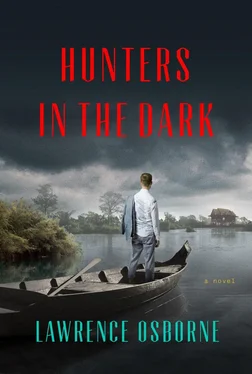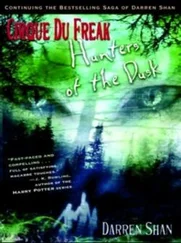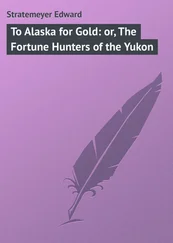—
Robert pushed a hand through his loose, foppish blond hair and the moths buzzed around his head. The car was returning and Ouksa was driving it with paranoid slowness as the tires slipped in the wet gravel. Simon smoked his cigar down and they waited for Ouksa to come back into the bar with his sheepish look and his acute suspicion. When he had done so they all rose and went to the car in a jovial mood and the owner emerged and told them not to worry about the bill. They came out into a faint moonlight and the glimmer of open sky and the bushes seemed alive with moths. They followed Simon’s taillight as he turned left from the bar and followed the river-hugging road past the last small villas and family houses and into the somber, purring open countryside and its dark palm-shaped silhouettes.
Here there was a network of unsurfaced roads that had no lights. Beaucamp’s house seemed to be the very last one of all, and was half a mile from the nearest neighbor, its back garden sloping right down to the river where there was a small private jetty. It was surrounded by a low gray wall and had two gray gateposts and a rusting iron gate. The garden was startlingly lush and wildly overgrown, with black ceramic amphorae standing about in the uncut grass and a hammock between two cotton trees. It was a simple concrete villa raised above the ground in the Khmer-village style by posts. But he had turned this ground-floor area into a kind of veranda which projected out to the water’s edge and was filled with sofas and carpets and low coffee tables. It was an original arrangement, artfully disheveled in the way that a superb dresser will be. The ceiling had four propeller fans and there was a drinks cabinet in one corner nicely protected from the elements.
Ouksa carried his bag to the door and Simon told him gently in Khmer that his duties for the day were at an end and he could leave.
“He looks relieved,” Simon said to Robert with a merry eye. “Can’t wait to be rid of us.”
But Robert walked Ouksa back to the car.
“This bad man,” Ouksa said in a low voice. “Dun you stay here.”
“He’s just a little odd — don’t worry. He’s American — I understand him. I’ll be fine.”
He slipped Ouksa the extra twenty dollars.
“Thank you. This man not what he look.”
The thought had gone through Robert’s mind several times by now but it had not been enough to deter him. He was not sure why. It was an open question whether it was the very thing that he was attracted to.
When Ouksa had driven off, the two white men sat on the veranda with gin and tonics. The open rafters of the house seemed immense in the night shadows, the moths spinning around the wooden beams. It looked like a house which Simon had built himself since it was so much better-looking than the houses he had seen up till then. Simon put on some music from the house above them. He took out his ornate Moroccan chessboard, with its pieces carved from argun wood and hand-painted, and they set it up on the coffee table between them. He said he had bought it long ago in Essaouria on the Atlantic coast and it had a “spirit” that helped his game. He laid out the pieces and they flipped for black and white and Robert got black. He kicked off his sandals and the alcohol swelled within him and he absorbed the humid smell of datura coming in from the forest. The roneat music was faintly chiming out in the pitch-black fields, a wailing of fiddles as well. Simon made the first move and soon he was winning easily. He was the kind of player who had all his moves prepared in his head long before he touched a single pawn.
Slowly, the whole sky visible above the bend in the river began to empty of clouds. It filled with a soft light that gradually made the sugar palms on the far bank more distinct and the piles of the jetty sharp and clear. The sweetness of this ripening night sky made Robert not care what time it had become. Birds sang in the forest, looping sing-song calls like those of macaws, and a million falling waterdrops merged together into a single sound. It was strange how trees kept dripping long after the rain had stopped. A country like a waterwheel, like a mass of wind chimes.
The second game had begun but it was slower in pace than the first one. More cheroots, lit with a certain ceremony.
There were feet on the steps, a pair of bare ankles appeared. They paused and Simon engaged his eye and smiled and put a finger against his lips. The girlfriend came down in a bathrobe, a slender Khmer yawning, and when she was at the bottom of the steps she turned and looked at them and said nothing, just walked over to the drinks cabinet and poured herself a tonic water.
“Sothea,” Simon said, “this is our new friend Robert, all the way from England. He’s a little deaf so you’ll have to speak up.”
She was dark and long-haired and oiled, and she looked from one man to the other and back again and said nothing at all. Simon said to her in Khmer, “You can go back to sleep if you want. We’re playing chess.”
“I can see what you’re doing,” she said.
She came over with her feet faintly oiled and smiled for Robert and he saw that her hair was wet. Her long fingers grasped the glass of tonic water with an awkward uncertainty, as if she were already resigned to the idea of dropping it and watching it smash.
“Sues’day,” she said, and nothing more.
“Are you hungry?” Simon said to Robert. “We can eat satay if you want.”
“Maybe a little.”
She went back up the stairs and soon there was a smell of cooking and they played the second game while the frogs seemed to come closer in the undergrowth. The moon became very still. The girl returned with a plate of pork satay on sticks and a little dipping sauce. She sat at the edge of Simon’s chair and watched his hands move his pieces back and forth. One could see the easy familiarity, the sexual tenderness between them. Simon began to dominate the board just as he had before and yet he seemed reluctant to win the game too quickly. He wanted to know about Robert.
“You don’t seem like a schoolteacher.”
“What do they seem like?”
“Oh, I don’t know. I only know American ones. They seem — depressed. It’s sort of a dead-end career, isn’t it?”
“I don’t know if I’d say that.”
“Well, obviously you wouldn’t. But that doesn’t make it untrue.”
“It doesn’t make it true either.”
Robert talked about his last two years. There was something false about it, a slight artificiality in his voice as he complained about his town and his job and his solitude.
“Do you believe in ghosts?” Simon said suddenly.
“Not at all.”
“You’re going to have a difficult time in this country then. You cannot be here and not believe in ghosts. Say, Sothea honey — do you believe in ghosts?”
Gravely, she stared at him and her mouth opened.
“See? They all believe in ghosts. Ghosts are more real to them than you and I are. That means ghosts are more important to them than we are. I like that view of the world myself. It seems serious.”
“Does she really believe in them?”
“It’s categorical. I’m a Yale man myself. Highly reasonable. But don’t hold it against me, because she doesn’t. And I believe in ghosts just as much as she does. I’ve come around to the idea. I prefer the idea. It goes against everything I was raised with.”
“I’ll drink to that.”
“Let’s drink to ghosts—”
The girl got up brusquely and walked out into the garden, where her hair shone and her cool distaste was removed from them. It was a disreputable thing to make a toast to but Robert had the sense that Simon had done it on purpose.
Читать дальше












